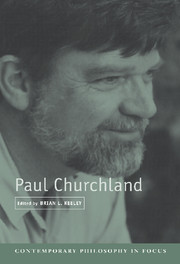Book contents
- Frontmatter
- Contents
- Preface
- Acknowledgments
- List of Contributors
- 1 Introduction: Becoming Paul M. Churchland (1942–)
- 2 Arguing For Eliminativism
- 3 The Introspectibility of Brain States as Such
- 4 Empiricism and State Space Semantics
- 5 Churchland on Connectionism
- 6 Reduction as Cognitive Strategy
- 7 The Unexpected Realist
- 8 Two Steps Closer on Consciousness
- Index
- References
Preface
Published online by Cambridge University Press: 05 June 2012
- Frontmatter
- Contents
- Preface
- Acknowledgments
- List of Contributors
- 1 Introduction: Becoming Paul M. Churchland (1942–)
- 2 Arguing For Eliminativism
- 3 The Introspectibility of Brain States as Such
- 4 Empiricism and State Space Semantics
- 5 Churchland on Connectionism
- 6 Reduction as Cognitive Strategy
- 7 The Unexpected Realist
- 8 Two Steps Closer on Consciousness
- Index
- References
Summary
Philosophy is, among other conceptions no doubt, a human quest for comprehension, particularly self-comprehension. Who am I? How should I understand the world and myself? It is in this context that the philosophical importance of Paul M. Churchland (PMC) is most evident. For three decades and counting, PMC has encouraged us to conceive of ourselves from the “Neurocomputational Perspective” – not only as a minded creature, but also as minded due to our remarkable nervous system. Our brains, ourselves. This represents a unique and interesting way to approach this hoary philosophical enquiry.
However, his lasting intellectual contribution as we enter a new millennium is not so much some particular way of seeing ourselves, but rather his unwavering belief that we are capable of perceiving the world and ourselves in ways very different from the norm. PMC has made a career as a sort of Patron Saint of Radical Re-conceptualization. Again and again he argues that we do not have to see ourselves in ordinary and well-worn terms. Copernicus had us throw out our commonsense framework of a flat, motionless Earth, wandering planets, and a sphere of fixed stars and showed us how to see the night sky with new eyes. PMC urges us to consider the possibility that many more such conceptual revolutions await us, if only we would give them a fair hearing.
The invocation of Copernicus is fitting. PMC is a philosopher of mind whose intuitions and ideas are primarily informed by science and the philosophy of science.
- Type
- Chapter
- Information
- Paul Churchland , pp. ix - xiiPublisher: Cambridge University PressPrint publication year: 2005

